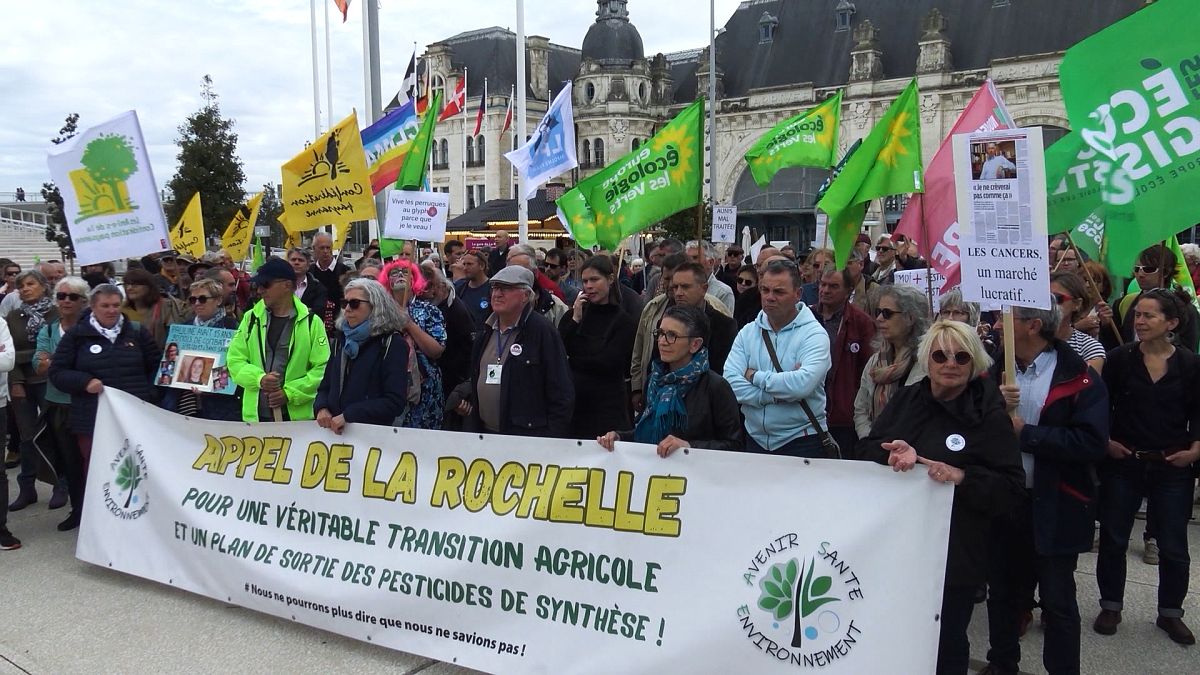Pesticides: a health hazard for Europeans ?

In Charente-Maritime, France, rising child cancer cases are suspected to be linked to pesticide exposure. Local residents are pushing for stricter national and EU regulations on pesticide use.
They are invisible, but traces of them can be found everywhere: in our food, in plants, in the soil, in groundwater, in the air and in our bodies.
These are pesticide residues. Europe is one of the world’s biggest consumers of them, and the leading exporter.
The risks they pose to the environment, and to animal and human health, are at the heart of a vigorous debate, particularly as regards their intensive use in the agricultural sector.
The European Union was planning to halve its use of them within a few years.
Yet it recently dropped this target under pressure from farmers and agrochemical lobbies.
Europeans’ Stories takes you to Charente Maritime, in the west of France. This department is home to a vast cereal-growing plain that consumes a lot of pesticides.
Residents of several municipalities in the region have sounded the alarm: cases of child cancer, some of which have resulted in death, have multiplied in recent years.
This situation gives Franck Rinchet-Girollet every cause for concern.
His 7-year-old son is in remission from bone cancer, diagnosed 5 years ago.
This former bus driver, now a parliamentary attaché, is Co-Chairman of the association Avenir Santé Environnement (Future Health Environment) set up by local residents who, like him, are fighting to find the cause of their children’s cancers.
“The reference air quality sensor in the area recorded 33 pesticides in 2019, 41 pesticides in 2021, and the French record for herbicides,” he says.
In October, the Association published the results of toxicological analyses carried out on 72 children from six municipalities in the conurbation.
“Fourteen pesticide molecules were found in the children’s urine and 45 in their hair. Among them, we found a number of banned molecules,” emphasises Franck Rinchet-Girollet.
“How is it that banned, carcinogenic molecules are still present, and that we continue to grant marketing authorisations for products that are still potentially endocrine disruptors and carcinogenic? Marketing authorisations for products are primarily granted at European level. And we see that authorised molecules turn out to be either probable carcinogens or reprotoxic mutagens.”
He exhorts the European Union to urgently support the agricultural sector in phasing out the use of synthetic pesticides.
“The further along we go, the more cases of paediatric cancer there will be. Our son is in remission, but we’ll always live with a sword of Damocles hanging over our heads. We want to raise awareness among national and European decision-makers. I wouldn’t wish the hell we went through with our son on anyone. But I tell myself that if they had lived through it, they might change the policies they put in place.”
Can the European Union protect its citizens better from the toxic effects of pesticides?
“European legislation on pesticides is one of the best in the world, but it is not implemented properly,” says Martin Dermine, Executive Director of PAN Europe, which campaigns for a pesticide-free Europe.
“The directive on the sustainable use of pesticides, for example, prioritises the introduction of preventive measures to avoid the use of pesticides, with simple techniques such as crop rotation or the use of pest-resistant varieties. This directive is not being implemented properly by the Member States. The European Commission must initiate infringement proceedings and be much stricter with the Member States.”
Martin Dermine is also convinced that Europeans could do without pesticides.
“The majority of pesticides used are not intended for the production of food that we consume directly. If we stopped subsidising crops that are exported outside the European Union, and concentrated CAP (Common Agricultural Policy) money on what we really eat, we could produce everything organically at the same cost as today. The problem is that our agriculture is completely open to international markets. And all this CAP money, which accounts for a third of the European Union’s budget, goes into the pockets of the pesticide and fertiliser industry, and is also used to subsidise exports.”
It should be noted that the European Ombudsman recently condemned the Commission’s failure to comply with the three-month time limit for decisions on the authorisation of dangerous chemical substances.
Delays sometimes last several years. During this time, companies can continue to distribute potentially toxic or carcinogenic products. So, Brussels can do better.
Source: Euro News














